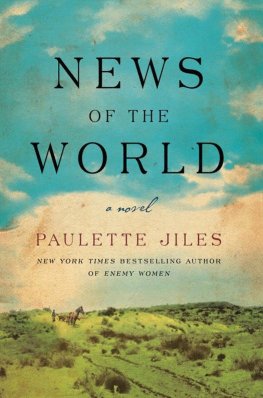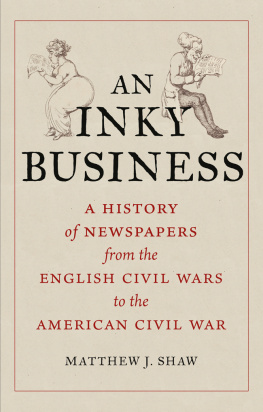News of the World: A Novel
Paulette Jiles

For friends on the long trails:
Susan, June, April, Nancy, Caroline, Wanda,
Evelyn, and Rita Wightman Whippet

Wichita Falls, Texas, Winter 1870
CAPTAIN KIDD LAID out the Boston Morning Journal on the lectern and began to read from the article on the Fifteenth Amendment. He had been born in 1798 and the third war of his lifetime had ended five years ago and he hoped never to see another but now the news of the world aged him more than time itself. Still he stayed his rounds, even during the cold spring rains. He had been at one time a printer but the war had taken his press and everything else, the economy of the Confederacy had fallen apart even before the surrender and so he now made his living in this drifting from one town to another in North Texas with his newspapers and journals in a waterproof portfolio and his coat collar turned up against the weather. He rode a very good horse and was concerned that someone might try to take the horse from him but so far so good. So he had arrived in Wichita Falls on February 26 and tacked up his posters and put on his reading clothes in the stable. There was a hard rain outside and it was noisy but he had a good strong voice.
He shook out the Journals pages.
The Fifteenth Amendment, he read, which has just been ratified on February 3, 1870, allows the vote to all men qualified to vote without regard to race or color or previous condition of servitude. He looked up from the text. His reading glasses caught the light. He bent slightly forward over the lectern. That means colored gentlemen, he said. Let us have no vaporings or girlish shrieks. He turned his head to search the crowd of faces turned up to him. I can hear you muttering, he said. Stop it. I hate muttering.
He glared at them and then said, Next. The Captain shook out another newspaper. The latest from the New-York Tribune states that the polar exploration ship Hansa is reported by a whaler as being crushed and sunk in the pack ice in its attempt to reach the North Pole; sunk at seventy degrees north latitude off Greenland. There is nothing in this article about survivors. He flipped the page impatiently.
The Captain had a clean-shaven face with runic angles, his hair was perfectly white, and he was still six feet tall. His hair shone in the single hot ray from the bulls-eye lantern. He carried a short-barreled Slocum revolver in his waistband at the back. It was a five-shot, .32 caliber and he had never liked it all that much but then he had rarely used it.
Over all the bare heads he saw Britt Johnson and his men, Paint Crawford and Dennis Cureton, at the back wall. They were free black men. Britt was a freighter and the other two were his driving crew. They held their hats in their hands, each with one booted foot cocked up against the wall behind them. The hall was full. It was a broad open space used for wool storage and community meetings and for people like himself. The crowd was almost all men, almost all white. The lantern lights were harsh, the air was dark. Captain Kidd traveled from town to town in North Texas with his newspapers and read aloud the news of the day to assemblies like this in halls or churches for a dime a head. He traveled alone and had no one to collect the dimes for him but not many people cheated and if they did somebody caught them at it and grabbed them by the lapels and wrenched them up in a knot and said, You really ought to pay your goddamn dime, you know, like everybody else.
And then the coin would ring in the paint can.
HE GLANCED UP to see Britt Johnson lift a forefinger to him. Captain Kidd gave one brief nod, and completed his reading with an article from the Philadelphia Inquirer concerning the British physicist James Maxwell and his theories of electromagnetic disturbances in the ether whose wavelengths were longer than infrared radiation. This was to bore people and calm them down and put them into a state of impatience to leaveleave quietly. He had become impatient of trouble and other peoples emotions. His life seemed to him thin and sour, a bit spoiled, and it was something that had only come upon him lately. A slow dullness had seeped into him like coal gas and he did not know what to do about it except seek out quiet and solitude. He was always impatient to get the readings over with now.
The Captain folded the papers, put them in his portfolio. He bent to his left and blew out the bulls-eye lantern. As he walked through the crowd people reached out to him and shook his hand. A pale-haired man sat watching him. With him were two Indians or half-Indians that the Captain knew for Caddos and not people of a commendable reputation. The man with the blond hair turned in his chair to stare at Britt. Then others came to thank the Captain for his readings, asked after his grown children. Kidd nodded, said, Tolerable, tolerable, and made his way back to Britt and his men to see what it was Britt wanted.
CAPTAIN KIDD THOUGHT it was going to be about the Fifteenth Amendment but it was not.
Yes sir, Captain Kidd, would you come with me? Britt straightened and lifted his hat to his head and so did Dennis and Paint. Britt said, I got a problem in my wagon.
She seemed to be about ten years old, dressed in the horse Indians manner in a deerskin shift with four rows of elk teeth sewn across the front. A thick blanket was pulled over her shoulders. Her hair was the color of maple sugar and in it she wore two down puffs bound onto a lock of her hair by their minute spines and also bound with a thin thread was a wing-feather from a golden eagle slanting between them. She sat perfectly composed, wearing the feather and a necklace of glass beads as if they were costly adornments. Her eyes were blue and her skin that odd bright color that occurs when fair skin has been burned and weathered by the sun. She had no more expression than an egg.
I see, said Captain Kidd. I see.
He had his black coat collar turned up against the rain and the cold and a thick wool muffler around his neck. His breath moved out of his nose in clouds. He bit his lower lip on the left side and thought about what he was looking at in the light of the kerosene hurricane lantern Britt held up. In some strange way it made his skin crawl.
I am astonished, he said. The child seems artificial as well as malign.
Britt had backed one of his wagons under the roof of the fairway at the livery stable. It didnt fit all the way in. The front half of the wagon and the drivers seat was wild with the drumming noise of the rain and a bright lift of rain-spray surrounded it. The back end was under shelter and they all stood there and regarded the girl the way people do when they come upon something strange they have caught in a trap, something alien whose taxonomy is utterly unknown and probably dangerous. The girl sat on a bale of Army shirts. In the light of the lantern her eyes reflected a thin and glassy blue. She watched them, she watched every movement, every lift of a hand. Her eyes moved but her head was still.
Yes sir, said Britt. Shes jumped out of the wagon twice between Fort Sill and here. As far as Agent Hammond can figure out she is Johanna Leonberger, captured at age six four years ago, from near Castroville. Down near San Antonio.
I know where it is, said Captain Kidd.










